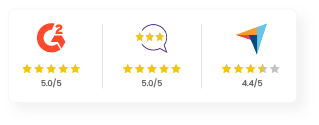A Complete Guide
Role of an LXP in Supporting Broader HR Goals Beyond DEI
Role of an LXP in Supporting Broader HR Goals Beyond DEI
While an LXP is transformative for DEI initiatives, its benefits extend far beyond by offering significant value to CHROs and HR leaders. Learning is often viewed as a valuable employee benefit that can help attract and retain talent within the organization. A LinkedIn Workplace Learning report even points out that 94% of employees are more likely to stay with an organization that invests in their professional development.
Given these evolving demands of today’s workforce, an LXP provides a flexible, scalable, and personalized platform for employees to develop and grow. By enabling more targeted and effective learning experiences, LXP helps organizations remain competitive. This culture, in turn, significantly supports broader HR goals, from employee retention to leadership development.
Which is why an LXP for HR technology aligns seamlessly with so many broader HR goals besides DEI, including:
Employee Retention
Employees today expect to grow continuously within their roles. When they have access to strong learning opportunities they can apply in their work and achieve results, they are less likely to seek career opportunities elsewhere. They want to work for organizations that support their development, not just offer a paycheck.
By offering engaging and personalized learning experiences, an LXP helps improve employee satisfaction and retention rates—a critical focus for CHROs.
With LXP-powered learning paths, employees are equipped to stay ahead in their careers. For example, providing employees with opportunities for skill-building through microlearning, where they can master specific competencies at their own pace, results in higher engagement and a greater sense of accomplishment. This directly impacts retention, as employees are less likely to leave an organization that actively supports their professional growth.
Moreover, an LXP also provides employees with the flexibility to engage in learning at their own pace and convenience. This flexibility is particularly attractive to employees who juggle multiple responsibilities, such as those in remote or hybrid work environments. This self-paced learning also enhances employee satisfaction, giving them a higher level of commitment and an increased likelihood of staying with the company.
Employee Development
An LXP also plays a key role in supporting employees’ professional development by delivering personalized learning experiences to them. It enables self-directed learning by offering resources from mentors, coaches, or materials tailored to learners’ interests and specific challenges.
Personalized learning paths ensure that each employee is not only engaging with content that is relevant to their current role but also with learning opportunities that help them grow into the next phase of their careers.
Plus, an LXP for employee development can support employee health and well-being, on-the-job training (OJT), formal training, compliance recertifications, and any other development opportunities that help employees succeed and feel more fulfilled in their roles. Health and well-being modules, for example, can offer stress-management techniques, mindfulness exercises, or access to wellness resources—addressing the holistic needs of employees. This type of learning ensures that employees are not only developing professionally but also maintaining a balanced and healthy work-life dynamic, which, in turn, can increase both productivity and retention.
By integrating all aspects of professional and personal growth into the LXP, organizations help employees feel more supported and engaged, improving their overall development experience.
Leadership Development
An LXP provides tailored learning paths for emerging leaders by equipping them with the skills required to drive organizational success. The growing complexity of the business world means that the future of an organization depends on the quality of its leadership. Leadership development programs within an LXP help identify high-potential employees and cultivate their leadership skills, preparing them to take on critical roles within the company.
These platforms offer access to mentorship, real-world case studies, and feedback tools so that leaders are well-prepared to manage diverse teams and lead with empathy. With mentoring features embedded in LXPs, emerging leaders can directly engage with senior leaders or subject matter experts to receive guidance and feedback, which accelerates their learning process. Real-world case studies and role-based simulations also allow these future leaders to practice decision-making in realistic scenarios which helps them hone their problem-solving skills and leadership style in a controlled, risk-free environment.
By nurturing leadership potential, an LXP helps HR leaders create a pipeline of future leaders who can navigate complex challenges within the organization. These leaders are better equipped to make strategic decisions, manage diverse teams, and drive innovation in the workplace.
Strategic Alignment
An LXP integrates learning with broader organizational objectives, from enhancing productivity to supporting digital transformation initiatives. A well-implemented LXP ensures that employee development is not only aligned with the needs of the employee but also the goals of the business.
With this, LXP ensures that employees are developing the skills needed to contribute to key priorities, whether it’s improving productivity, innovation, customer satisfaction, or embracing new technologies. For instance, if an organization is undergoing a digital transformation, an LXP can deliver training modules on digital tools, processes, and methodologies that align with the company’s digital goals. This alignment ensures that employees are not only learning for the sake of learning but are also directly contributing to the company’s success by acquiring the skills needed to implement these changes. By creating a direct link between the learning experience and the company’s strategic objectives, the LXP helps ensure that learning outcomes contribute to the broader business agenda.
In addition, an LXP supports a culture of continuous improvement, where the learning journey is never static. As the business environment evolves and new challenges arise, an LXP can be quickly updated to reflect new goals, priorities, or regulatory changes.
This adaptability makes an LXP an indispensable tool for businesses that are constantly shifting and evolving, as they ensure employees are always learning what is most relevant to the current business climate. By investing in an LXP, organizations are not just addressing current skill gaps but are preparing their workforce for future challenges, ensuring long-term organizational success. An LXP is a strategic investment for CHROs, delivering value across multiple dimensions.






